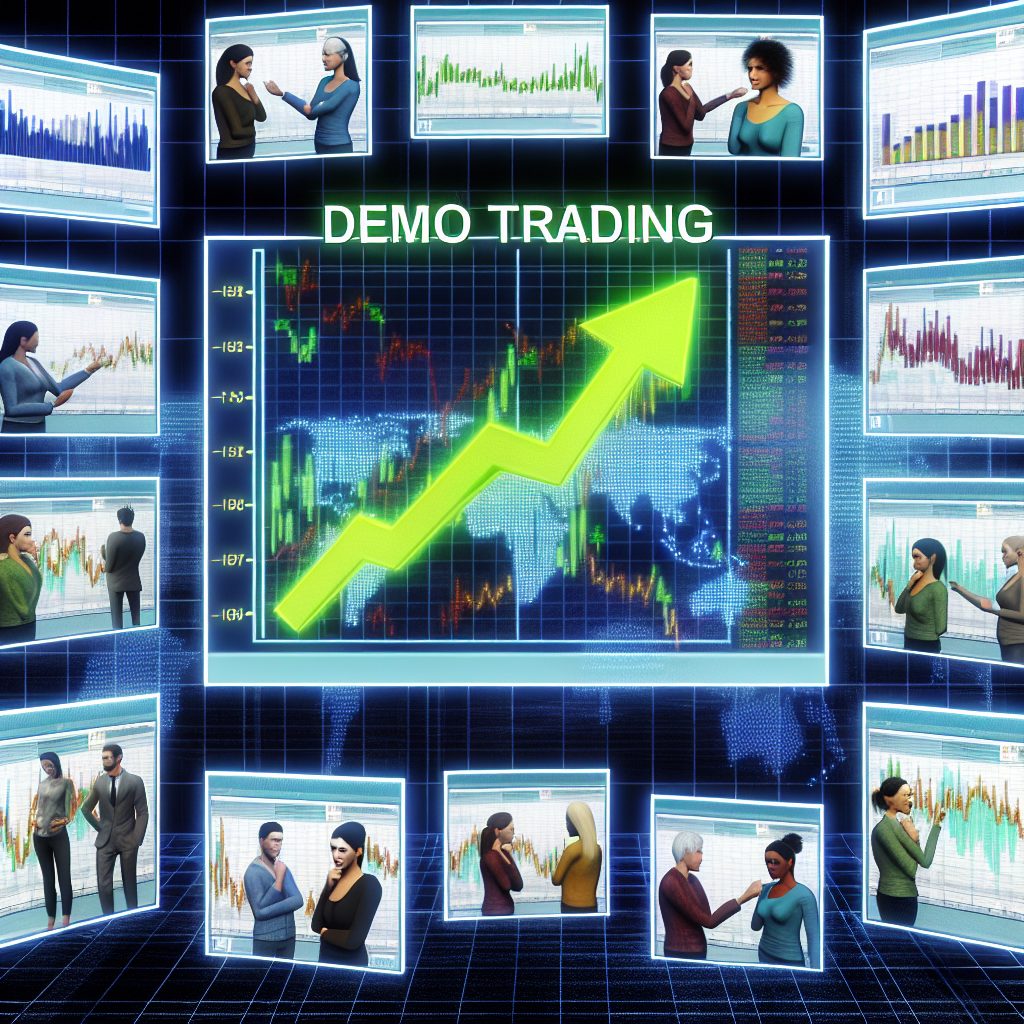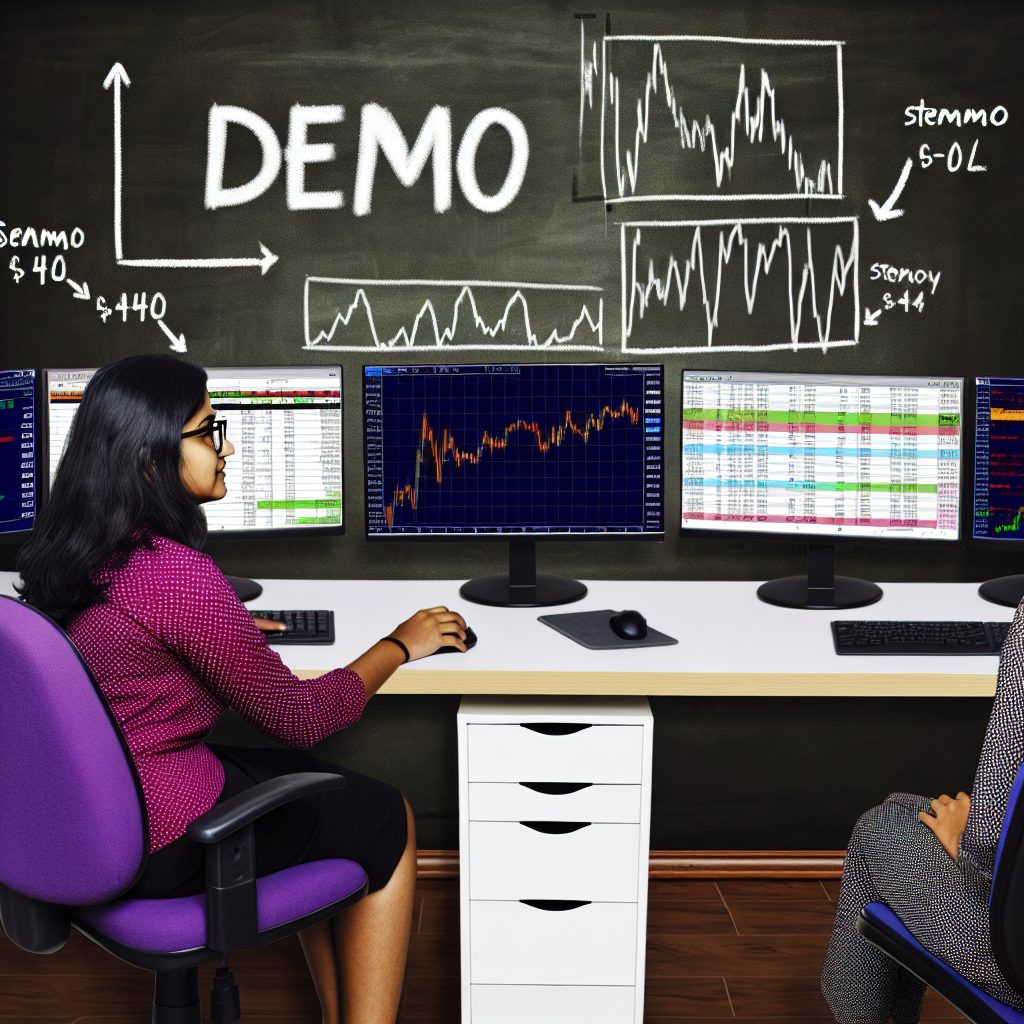
“Practice Makes Profit: Master the Markets with Risk-Free demo trading“
The Role of Demo Trading in Developing Trading Strategies
The Importance of demo trading
In the world of financial trading, the leap from theory to practice is often fraught with risk and uncertainty. This is where demo trading becomes an invaluable tool, serving as a bridge between learning about market dynamics and executing live trades. demo trading, or paper trading, allows individuals to practice their trading strategies using virtual money in a simulated market environment. This risk-free setting is crucial for both novice and experienced traders to develop, test, and refine their trading strategies before putting real capital on the line.
demo trading platforms replicate real market conditions, providing traders with access to historical data, real-time market quotes, and all the tools and functionalities they would encounter in a live trading environment. This realistic simulation ensures that traders can gain practical experience without the emotional and financial stress associated with real losses. As a result, traders can focus on understanding market movements, learning how to interpret charts and indicators, and becoming familiar with order types and execution without the fear of making costly mistakes.
Moreover, demo trading plays a pivotal role in helping traders develop a disciplined approach to the markets. It allows them to establish and follow a trading plan, set risk management rules, and practice maintaining composure during volatile market conditions. By repeatedly applying their strategies in a variety of market scenarios, traders can identify strengths and weaknesses in their approach. This iterative process is essential for building confidence and ensuring that when the time comes to transition to live trading, the trader is well-prepared to handle the psychological pressures that come with real financial stakes.
Another significant advantage of demo trading is the opportunity it provides for backtesting trading strategies. Backtesting involves applying a trading strategy to historical market data to determine its viability. By using a demo account, traders can simulate how a strategy would have performed in the past without risking actual capital. This can reveal valuable insights into the potential profitability of a strategy and highlight any adjustments that may be needed to improve its effectiveness.
Furthermore, the dynamic nature of financial markets means that even seasoned traders need to continually adapt their strategies. demo trading offers a platform for experienced traders to experiment with new techniques or adapt to changing market conditions. It is a space for innovation and creativity, where traders can explore unconventional ideas and unconventional assets without the repercussions that come with unsuccessful trades in a live environment.
In conclusion, demo trading is an indispensable component in the development of robust trading strategies. It provides a practical and secure environment for traders to learn, practice, and perfect their craft. By leveraging the benefits of demo accounts, traders can enhance their understanding of the markets, refine their trading techniques, and build the confidence necessary to navigate the complexities of live trading. Whether one is just starting out or looking to expand their trading repertoire, the role of demo trading in the journey to becoming a successful trader cannot be overstated. It is the proving ground where strategies are born, tested, and honed, ultimately laying the foundation for a trader's long-term success.
How Demo Trading Prepares You for Real Market Conditions
The Importance of demo trading
Embarking on the journey of trading can be both exhilarating and daunting. Aspiring traders are often eager to dive into the markets, driven by stories of substantial profits and transformative financial success. However, the stark reality is that the world of trading is fraught with risks and complexities that can be overwhelming for the uninitiated. This is where demo trading becomes an invaluable tool, serving as a bridge between theoretical knowledge and real-world application.
demo trading, or paper trading, allows individuals to practice their trading strategies using virtual money in a simulated market environment. This risk-free setting is crucial for developing a deep understanding of market dynamics without the fear of losing actual capital. By engaging in demo trading, individuals can familiarize themselves with the trading platform, learn to interpret market indicators, and refine their decision-making processes.
One of the primary benefits of demo trading is the opportunity it provides to test out trading plans and strategies. It is one thing to conceptualize a trading strategy, but quite another to see how it performs under live market conditions. Demo accounts offer a real-time experience of how markets react to global events, economic data releases, and other traders' actions. This hands-on approach helps traders to identify potential flaws in their strategies and make necessary adjustments before real money is at stake.
Moreover, demo trading helps in cultivating emotional discipline, a critical aspect of successful trading. The emotional rollercoaster of gains and losses can lead to impulsive decisions, often resulting in suboptimal trades. By practicing in a simulated environment, traders can learn to manage their emotions, develop patience, and adhere to their trading plans, all of which are essential skills for navigating the real markets.
Another significant aspect of demo trading is the ability to become proficient with the trading platform itself. Each platform comes with its own set of tools, indicators, and order types. Mastery of these technical aspects is essential to execute trades efficiently and effectively. Through demo trading, individuals can explore different features, customize their trading workspace, and gain confidence in their ability to operate the platform seamlessly when every second counts.
Furthermore, demo trading allows for the exploration of various financial instruments and markets. Whether it's stocks, forex, commodities, or cryptocurrencies, each market has its own characteristics and nuances. A demo account enables traders to experiment with these different asset classes, understand their unique volatility patterns, and determine which markets best suit their trading style and risk tolerance.
It's important to note, however, that while demo trading is an excellent preparation tool, it cannot fully replicate the psychological pressures of real trading. The absence of real financial risk can lead to overconfidence or a lack of seriousness that might not translate well when real funds are on the line. Therefore, while demo trading is a critical step in a trader's development, it should be complemented with a gradual transition to live trading with small amounts to acclimate to the emotional and psychological aspects of trading with actual capital.
In conclusion, demo trading is an indispensable component of a trader's education. It prepares individuals for real market conditions by providing a platform to practice strategies, develop emotional discipline, learn the technicalities of trading platforms, and explore various markets without financial risk. As traders progress from demo accounts to live trading, the experience gained from paper trading can be the foundation upon which successful trading careers are built.
The Psychological Benefits of Starting with Demo Trading

Title: Importance of demo trading
Embarking on the journey of trading can be as thrilling as it is daunting, particularly for novices who are just getting their feet wet in the complex world of financial markets. One of the most invaluable tools at a beginner's disposal is demo trading, a simulated trading environment where the risk of financial loss is non-existent. The psychological benefits of starting with demo trading are manifold, and they lay a solid foundation for a trader's future in the markets.
demo trading serves as a practical introduction to the mechanics of trading, allowing individuals to familiarize themselves with the trading platform, order types, and market conditions without the pressure of real capital at stake. This risk-free setting is crucial for building confidence. As beginners navigate through trades, they gain a sense of assurance in their decision-making process. This confidence, cultivated in a safe environment, is essential when transitioning to live trading, where the stakes are real and the emotions are significantly heightened.
Moreover, demo trading provides a sandbox for strategy development. Traders can experiment with various techniques and analyze their outcomes to refine their approach. This experimentation is vital for understanding what strategies align with one's trading style and risk tolerance. By testing different methods, traders learn to adapt to changing market conditions, a skill that is indispensable when real money is on the line. The psychological comfort of knowing that a strategy has been vetted in a demo environment can alleviate some of the stress associated with its implementation in live trading.
Another psychological advantage of demo trading is the management of emotional responses. Trading can evoke strong emotions such as fear, greed, and frustration, which can cloud judgment and lead to impulsive decisions. By starting with a demo account, traders have the opportunity to observe their emotional triggers in a controlled setting. This self-awareness is a critical component of emotional regulation, which, when mastered, can greatly improve decision-making in live trading scenarios.
Furthermore, demo trading allows for the development of discipline, a trait that is often overlooked yet is paramount for long-term success in trading. The temptation to deviate from a trading plan can be overwhelming, especially in the face of losses or unexpected market movements. Practicing discipline in a demo account helps to engrain good habits, such as sticking to a trading plan and setting appropriate stop losses. These habits, once solidified, can make the difference between success and failure in the real markets.
Lastly, the transition from demo to live trading can be less of a psychological shock if a trader has spent adequate time in a demo environment. The experience gained from demo trading can ease the anxiety associated with the unpredictability of live markets. While the emotional intensity of trading with real money cannot be fully replicated in a demo account, the skills and confidence built during this phase can provide a buffer against the psychological turmoil that often accompanies the shift to live trading.
In conclusion, the psychological benefits of starting with demo trading are as significant as the technical skills acquired during this phase. By providing a risk-free platform for learning, strategy testing, emotional regulation, discipline practice, and transition preparation, demo trading is an indispensable step in a trader's development. It equips individuals with the mental fortitude required to navigate the tumultuous waters of financial markets, ultimately contributing to a more measured and successful trading career.
Demo Trading as a Risk-Free Learning Tool for Beginners
Title: Importance of demo trading
demo trading serves as an invaluable risk-free learning tool for beginners in the world of financial markets. It provides a platform where aspiring traders can hone their skills, develop strategies, and gain confidence without the fear of losing real money. This simulated trading environment replicates the real market conditions, offering a practical experience that is crucial for building a solid foundation in trading.
For novices, the financial markets can be daunting, with their complex charts, numerous indicators, and the constant flux of prices. demo trading allows beginners to familiarize themselves with these aspects in a controlled setting. They can learn how to navigate trading platforms, place orders, and understand the mechanics of executing trades. This hands-on approach is instrumental in helping newcomers grasp the intricacies of market operations.
Moreover, demo trading is not just about learning the technicalities; it's also about developing a psychological readiness. Trading involves a significant emotional component, as market fluctuations can prompt reactions driven by fear or greed. By practicing in a demo environment, beginners can observe their emotional responses to wins and losses, learning to maintain composure and make rational decisions. This emotional preparedness is as important as technical knowledge when transitioning to real trading.
Another advantage of demo trading is the opportunity to test strategies without any financial risk. Beginners can experiment with different approaches to find what works best for them. They can backtest these strategies against historical data and refine them in real-time with current market conditions. This trial-and-error process is essential for identifying profitable trading methods. Without the pressure of real capital at stake, beginners can objectively evaluate the effectiveness of their strategies and make necessary adjustments.
Furthermore, demo trading provides a platform for continuous learning. The financial markets are dynamic, with new patterns and trends emerging regularly. Beginners can use demo accounts to stay updated with these changes and adapt their strategies accordingly. This ongoing education is vital for long-term success in trading.
It's important to note that while demo trading is an excellent learning tool, it does have its limitations. The absence of real money can lead to a lack of emotional attachment, which might not accurately represent the psychological challenges faced in live trading. Additionally, market conditions in a demo account may not always mirror live trading environments perfectly due to factors like slippage and order execution speed. Therefore, while demo trading is a critical step in a trader's journey, it should be complemented with other educational resources and eventually, a cautious transition to live trading with small amounts.
In conclusion, demo trading is an indispensable tool for beginners in the financial markets. It offers a risk-free environment to learn, practice, and develop the necessary skills and strategies required for successful trading. By taking advantage of demo accounts, beginners can build confidence, gain experience, and prepare themselves both technically and emotionally for the challenges of real-world trading. As they progress, the insights gained from demo trading can serve as a foundation for a potentially rewarding trading career, provided they recognize its limitations and the need for an eventual shift to the live markets.
Evaluating Trading Platforms: The Importance of Demo Trading Features
Evaluating Trading Platforms: The Importance of demo trading Features
In the dynamic world of financial markets, the ability to test strategies and familiarize oneself with various trading platforms without risking actual capital is invaluable. demo trading serves as a critical educational tool for both novice and seasoned traders, allowing them to hone their skills, evaluate different trading platforms, and develop a deeper understanding of market dynamics before committing real money.
demo trading features simulate real market conditions, providing a risk-free environment where users can practice executing trades, test out technical analysis tools, and get comfortable with the platform's interface. This hands-on experience is crucial for building confidence and ensuring that when the time comes to transition to live trading, investors are well-prepared to navigate the complexities of the market.
For beginners, the leap into trading can be daunting. The availability of demo accounts allows them to start with the basics, such as understanding order types, without the pressure of potential losses. It's an opportunity to learn by doing, which is often more effective than purely theoretical learning. By experimenting with different strategies in a controlled setting, newcomers can discover what works best for them and gain insights into their own trading psychology.
Experienced traders also benefit from demo trading, as it enables them to test new strategies or refine existing ones. Markets are constantly evolving, and even the most seasoned professionals must adapt to changes in market conditions, regulatory environments, and technological advancements. Demo accounts provide a platform for experimentation without the risk of diminishing a trader's capital.
Moreover, demo trading is an excellent way to evaluate the features and performance of different trading platforms. Traders can assess the responsiveness of the platform, the ease of navigation, the quality of customer support, and the robustness of the tools and resources available. This hands-on evaluation is far more telling than reviews or recommendations alone. It allows traders to ensure that the platform aligns with their trading style and preferences, which is essential for long-term success.
Another significant advantage of demo trading is the ability to test the platform's stability and reliability. During periods of high volatility, platforms may experience delays or glitches. It's better to encounter and understand these issues in a demo environment than to be caught off guard with real money on the line. Traders can also evaluate the accuracy of the platform's pricing and execution speeds, which are critical factors in fast-paced markets.
Furthermore, demo accounts can be used to familiarize oneself with new asset classes or markets. For instance, a trader with experience in equities might use a demo account to explore the nuances of forex or commodities trading. This versatility expands a trader's expertise and opens up new opportunities for diversification.
In conclusion, demo trading is an indispensable feature when evaluating trading platforms. It offers a practical and effective way for traders to gain experience, test strategies, and ensure that the platform they choose is well-suited to their needs. By providing a realistic and risk-free environment, demo accounts play a pivotal role in a trader's development and preparedness. As such, traders should prioritize platforms that offer comprehensive and user-friendly demo trading options, recognizing that these features are more than just a convenience—they are a cornerstone of strategic trading and informed decision-making.


